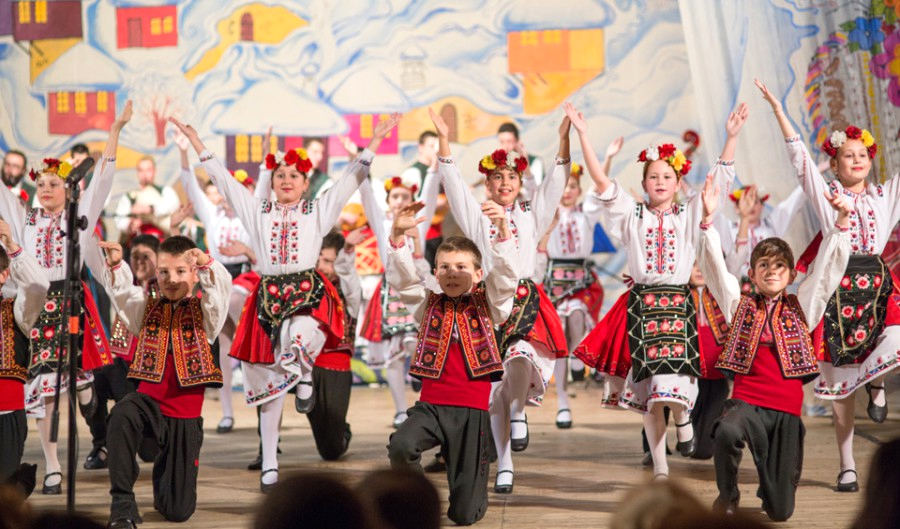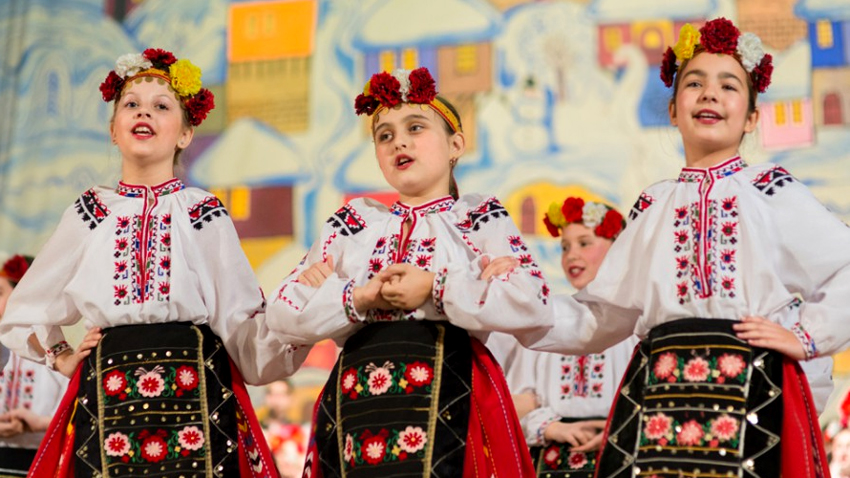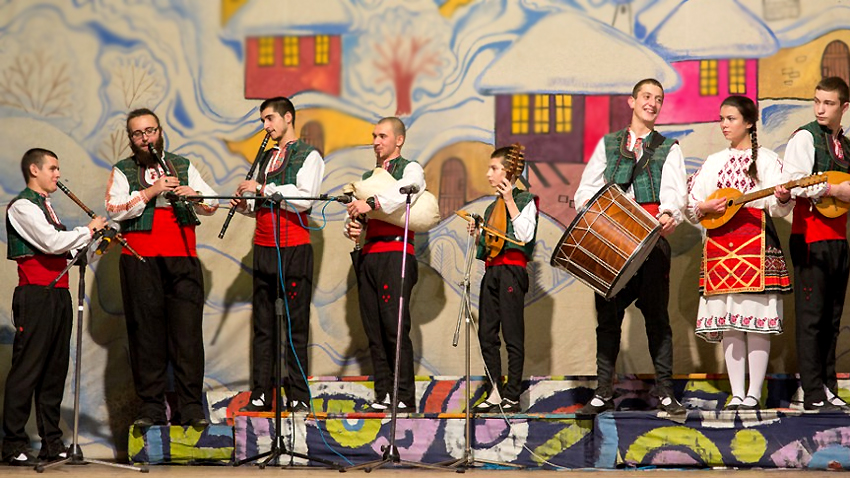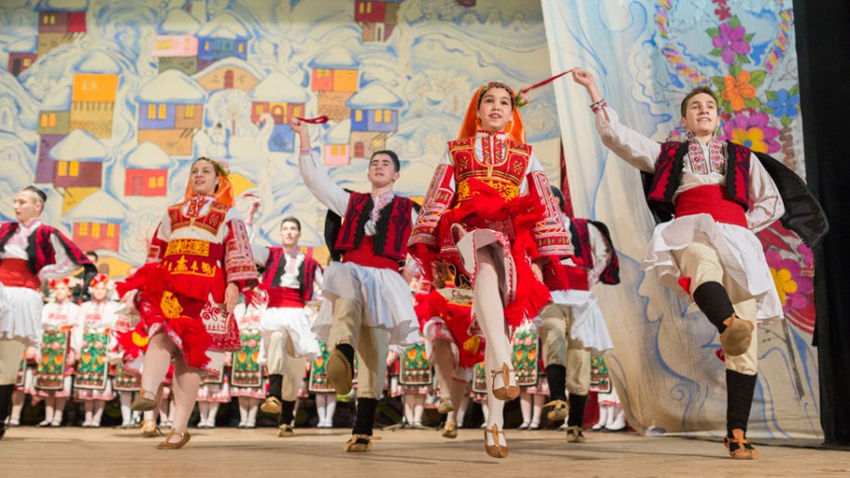The Children Folk Ensemble Bulgarche has been keeping up for decades its traditions and good name. It was founded by Mihail Dulgerov in 1968 as part of the Municipal Children Complex in Veliko Tarnovo (Central North Bulgaria). Thousands of dancers, singers and instrumentalists took part in that formation over the years. Currently the folk ensemble consists of nearly 200 children.
Children usually join Bulgarche folk ensemble at the age of four or five and stay there until they graduate from high school. The dance formation is headed by choreographer Petar Petrov. Associate Professor Mitko Dimitrov conducts the orchestra and Galya Ivanova heads Bulgarche folk choir. The repertoire of Bulgarche folk ensemble includes different music and folklore regions in Bulgaria. Of course the accent falls on the preservation of local folklore.

Galya Ivanova has been leading Bulgarche folk choir for 22 whole years. She graduated from the Academy of Music, Dance and Fine Arts in Plovdiv. “I had the chance to join Bulgarche folk ensemble right after I graduated from the music academy and I can work what I love the most”, Galya says and adds:
 “Many children have been part of our ensemble over the years. Those who want to continue in that field stay with us even when they graduate from high school. Each formation provides music training. It also has a starting group and main concert formation. We also offer individual lessons in mandolin, bagpipe, rebec and shepherd's flute. The lecturers are professional musicians, Nearly 60 children sing in Bulgarche folk choir. We hold many concerts. We also tour a lot across Bulgaria. In 2016 Bulgarche folk choir and orchestra won the top prize at the National Folk Competition for Folk singers and Instrumentalists in Ruse. Bulgarche has also won many individual awards. Each year we participate in at least two international forums abroad. We visited different countries and cities such as Thailand, Sardinia, Venice and other Italian cities. We toured almost the whole Europe - we held concerts in Germany, France, Serbia, etc.”
“Many children have been part of our ensemble over the years. Those who want to continue in that field stay with us even when they graduate from high school. Each formation provides music training. It also has a starting group and main concert formation. We also offer individual lessons in mandolin, bagpipe, rebec and shepherd's flute. The lecturers are professional musicians, Nearly 60 children sing in Bulgarche folk choir. We hold many concerts. We also tour a lot across Bulgaria. In 2016 Bulgarche folk choir and orchestra won the top prize at the National Folk Competition for Folk singers and Instrumentalists in Ruse. Bulgarche has also won many individual awards. Each year we participate in at least two international forums abroad. We visited different countries and cities such as Thailand, Sardinia, Venice and other Italian cities. We toured almost the whole Europe - we held concerts in Germany, France, Serbia, etc.”
 “We have been struggling in recent years to attract singers and instrumentalists, but the interest in Bulgarian dance remains”, Galya Ivanova went on to say. “Our purpose is to make children fall in love with Bulgarian traditions. Unfortunately, many radio stations and TV channels play the so-called pop folk music which “pollutes music environment to some extent”. When children join our ensemble, feel the vibrations of the real folklore music and step on the concert stage, they become more motivated and it is easier to work with them. In the beginning we pay big attention to their parents, because they have to spend their spare time to take children to rehearsals and concerts. However, they realize that folk music lessons feed their children' spirits and that children relieve themselves from the everyday pressure and stress. All we have to do in that case is to continue teaching children and more forward. ”
“We have been struggling in recent years to attract singers and instrumentalists, but the interest in Bulgarian dance remains”, Galya Ivanova went on to say. “Our purpose is to make children fall in love with Bulgarian traditions. Unfortunately, many radio stations and TV channels play the so-called pop folk music which “pollutes music environment to some extent”. When children join our ensemble, feel the vibrations of the real folklore music and step on the concert stage, they become more motivated and it is easier to work with them. In the beginning we pay big attention to their parents, because they have to spend their spare time to take children to rehearsals and concerts. However, they realize that folk music lessons feed their children' spirits and that children relieve themselves from the everyday pressure and stress. All we have to do in that case is to continue teaching children and more forward. ”

Many members of Bulgarche folk ensemble maintain relations with traditional Bulgarian art for life such as folk singers Velichka Chausheva, Bilyana Sokolova and Yanitsa Brantselova. Yanitsa has been conducting for several months the Mixed Choir with Konstantin Kisimov Music and Drama Theatre in Veliko Tarnovo.
English version: Kostadin Atanasov
Photos: bulgarche.com
The audio features the following performances:
1 Gankino, (Gankino chain dance) to the rendition of Bulgarche folk ensemble orchestra
2 Kakvo Se Horo Izvilo, (A chaindance is winding) to the rendition of Zlatimira Stefanova in accompaniment of Bulgarche folk ensemble orchestra
3 Mar, Shto Shtat Tuka, Tudoro, (Why are they here, Tudoro) to the rendition of Bulgarche children's folk choir
4 Brei De Sei Chulo I Vidialo, (Something never heard of!) Bulgarche folk ensemble
5 Momino Horo,(Girls' chain dance) to the rendition of Bulgarche folk ensemble
The historic town of Tryavna will celebrate St Lazarus' Day, traditionally held on the Saturday before Palm Sunday. The Bulgarian custom, known as lazaruvane , is closely linked to the themes of love and marriage and will be re-enacted this..
The feast of the Annunciation (Blagoveshtenie in Bulgaria) is a holy day , a symbol of God’s infinite mercy to people and especially to women, blessed to bear new life, but also an embodiment of the eternal human longing for something better in the..
Clocks and bells will ring out in the center of Stara Zagora on Saturday, when the city will host the XXIV Masquerade Games Festival . The event will start with a traditional parade of participants. Attractive babugers, araps, old men and other..

+359 2 9336 661
